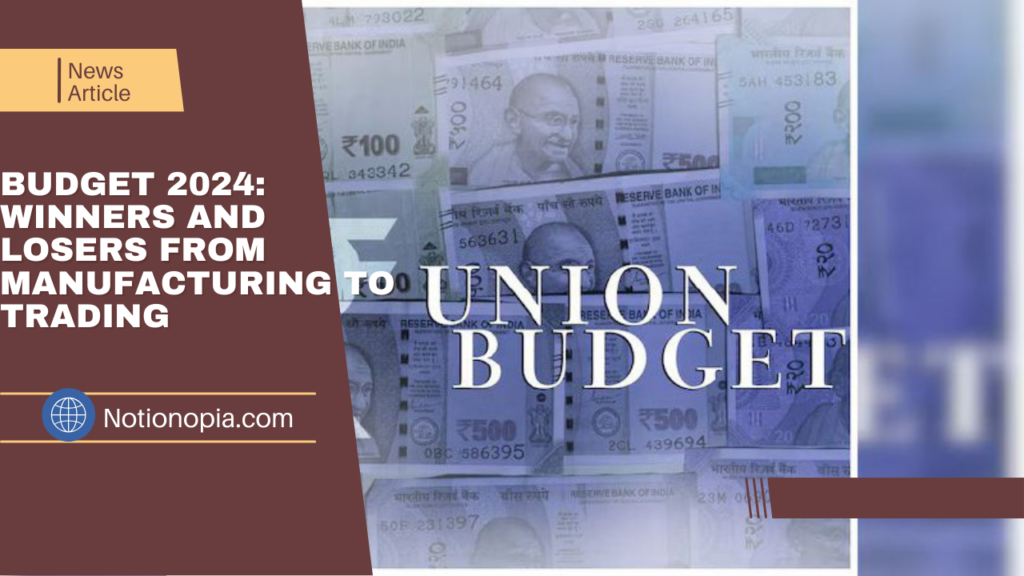Economic Survey 2024 Live: RBI expects headline inflation to be 4.5% in FY25 and 4.1% in FY26, Economic Survey notes.

India will reveal its budget on July 23, marking the first significant policy move of Prime Minister Narendra Modi’s third term. This new budget might shift economic priorities, especially after Modi’s party secured an unexpected election win with the help of allies. The administration aims to boost consumer spending in Asia’s third-largest economy by possibly lowering personal taxes or ramping up expenditure in consumer-centric sectors. This could benefit some industries while impacting others.
Expected Beneficiaries:
Rural-Linked Sectors:
The government will likely allocate more funds for rural development programs to encourage consumption. This move could benefit consumer goods manufacturers like Hindustan Unilever and two-wheeler producers such as TVS Motor and Hero MotoCorp, according to Citi. A potential increase of less than 5-7% in tobacco taxes could positively impact ITC, India’s largest cigarette manufacturer, per Jefferies.
Real Estate:
Increased funding for affordable housing is anticipated, benefiting developers like Macrotech Developers and Sunteck Realty, as per Citi. Additionally, an interest subsidy scheme for urban housing would support financiers like Aavas Financiers and Home First Finance, Jefferies noted.
Automakers:
India has previously allocated Rs 11,500 crore ($1.38 billion) in subsidies over five years to promote electric vehicle (EV) adoption. Macquarie expects the government to maintain both the amount and duration of these subsidies. This would benefit Tata Motors, the leading e-car manufacturer in India, along with IPO-bound e-scooter maker Ola Electric and e-bus manufacturers Olectra Greentech and JBM Auto. Conversely, lower-than-expected EV subsidies could favor Maruti Suzuki, India’s top-selling car manufacturer, which has opted to produce hybrid cars instead of pure EVs.
Manufacturing:
HSBC anticipates a continued push for production-linked incentive schemes that promote local manufacturing and job creation. This will aid manufacturers of technology hardware, telecom equipment, electronics, and medical devices, including companies like Dixon Technologies, Ideaforge Technology, and Biocon. Additionally, capital goods companies such as Larsen & Toubro and infrastructure firms might benefit from an expected increase in capital expenditure, according to Jefferies.
Potential Losers:
Trading:
Any changes in capital gains tax, such as raising the holding period or tax rate, could negatively affect equities, stated Morgan Stanley, although they believe such changes are unlikely. However, if implemented, these changes would increase the tax burden on equity and mutual fund investors, diminishing the tax benefits they currently enjoy compared to other asset classes. This could also result in reduced trading volumes, adversely impacting brokerages like Motilal Oswal, ICICI Securities, Angel One, and 5 Paisa.
The mutual fund association in India has requested that mutual fund units be exempted from long-term capital gains tax. Additionally, the government and regulators are looking to curb derivatives trading—seen as risky and speculative—which has largely driven the stock market’s rally since the COVID-19 pandemic. Any move to impose higher taxes on derivatives trading would not only affect the market but also reduce trading volumes, impacting brokerages and trading platforms, Jefferies noted.
Highlights from the Mini Economic Survey
The mini-economic survey presented in January suggested that India could aim to become a $7 trillion economy by 2030. Chief Economic Advisor (CEA) Nageswaran expressed confidence that if there are no major disruptions in FY25, it could mark the fourth consecutive year of over 7% growth post-pandemic. However, the report also highlighted several challenges to India’s growth trajectory, noting that the country’s economic outlook depends on both domestic performance and global developments.
The report pointed out that artificial intelligence (AI) presents a significant challenge to governments worldwide due to its impact on employment, especially in the services sector. AI could potentially reduce the cost competitiveness of countries exporting digital services. Furthermore, the survey mentioned that geopolitical tensions and the Red Sea crisis could hinder India’s goods and services exports, leading to slower global trade growth in 2023.
“This reinforces the need to lower logistics costs and invest in product quality to hold on to and expand market share in areas where India has an advantage,” the mini-economic survey stated.



